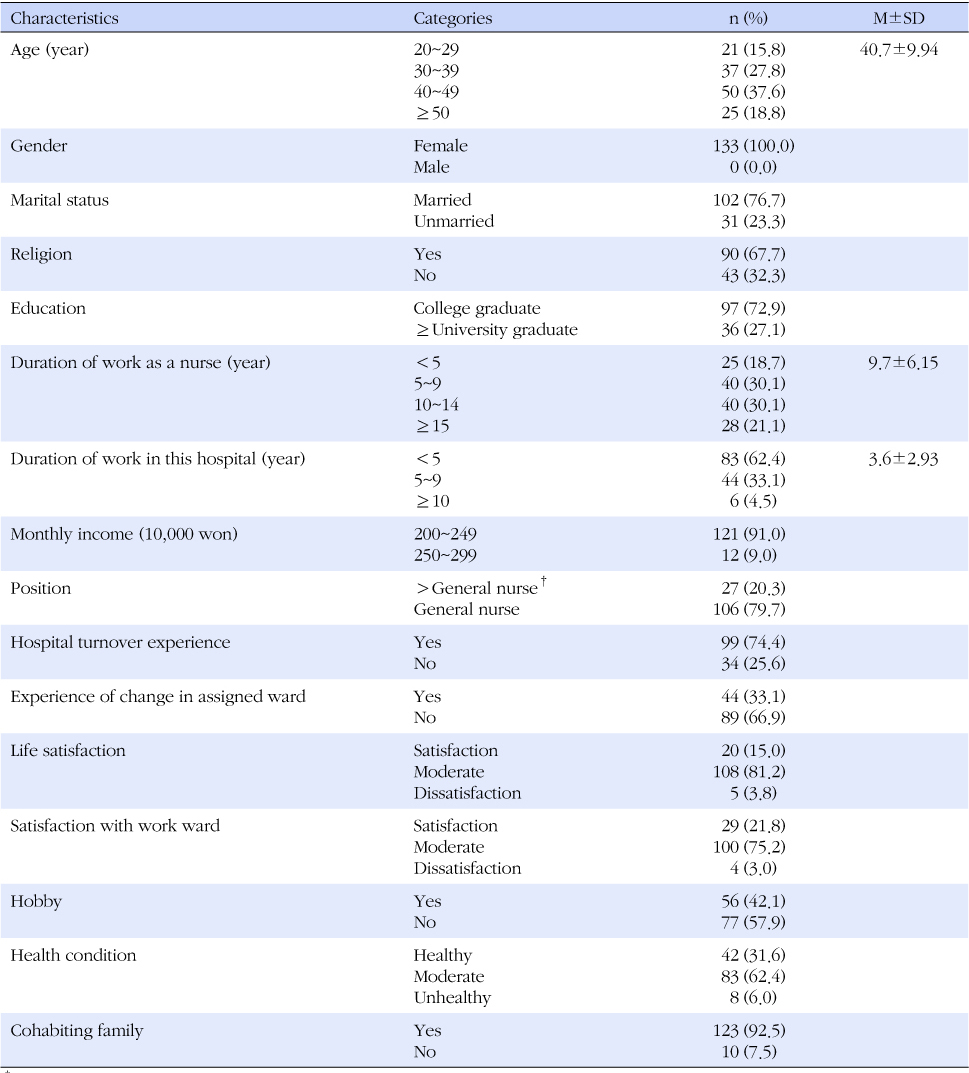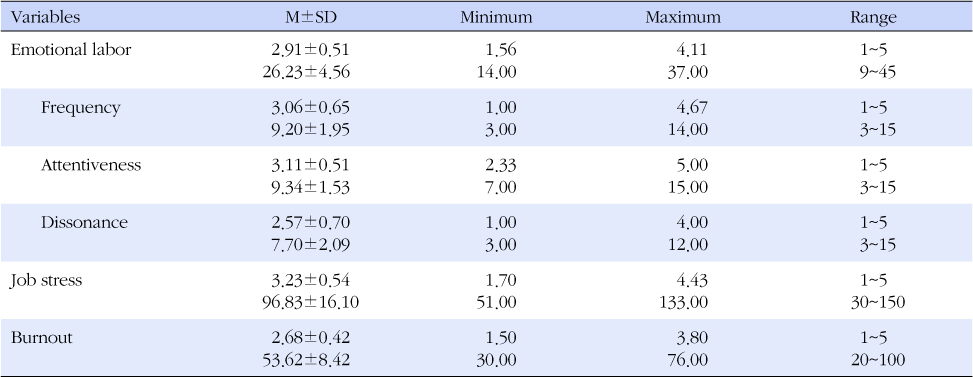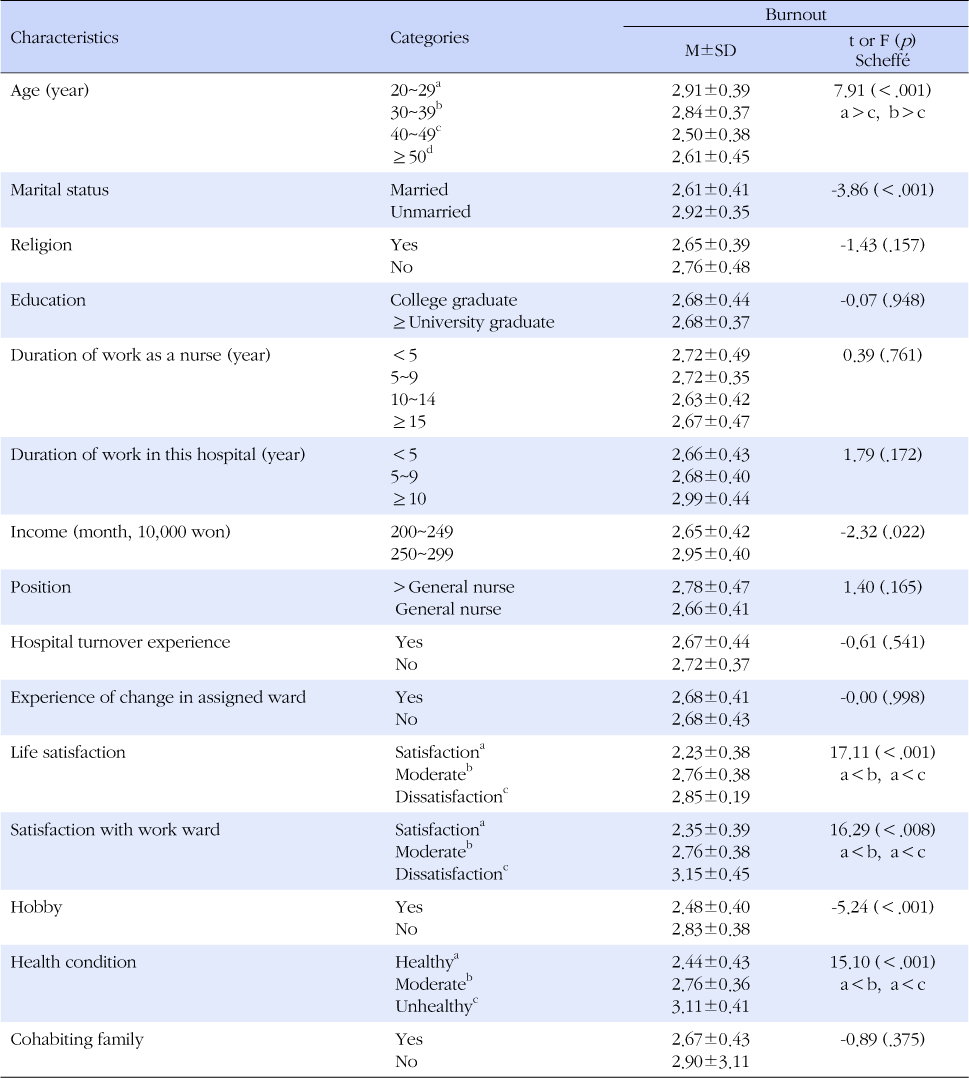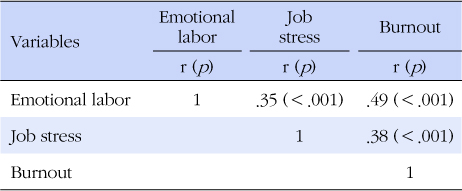| Original Article
| | | | | | | Predictors of Emotional Labor and Job Stress on Burnout of Nurses in Long-term Care Hospitals | | Ja-Sook Kim,1Seon Young Jeong,2Su Hyun Kim,1and Ja Ok Kim*3 | 1Department of Nursing, Dongkang College, Gwangju, Korea.
| 2Department of Nursing, Namwon Geriatric Hospitals, Namwon, Korea.
| 3Department of Nursing, Wonkwang Health Science University, Iksan, Korea.
| *Corresponding author: Kim, Ja Ok. Department of Nursing, Wonkwang Health Science University, 514 lksan Daero, Iksan 570-750, Korea. Tel: +82-63-840-1306, Fax: +82-63-840-1306, Email: jjaoki-93@wu.ac.kr | | Received February 06, 2014; Revised March 25, 2014; Accepted May 20, 2014.
| This is an open-access article distributed under the terms of the Creative Commons Attribution Non-Commercial License (http://creativecommons.org/licenses/by-nc/3.0/), which permits unrestricted non-commercial use, distribution, and reproduction in any medium, provided the original work is properly cited.
| | Abstract |
PurposeThe purpose of this study was to identify the predictors of burnout among nurses in long-term care hospitals. MethodsData were collected from 133 nurses who worked in long-term care hospitals from January 9 to February 8, 2013. The self-report questionnaire was used to assess the level of emotional labor, job stress and burnout. The PASW Statistics 18.0 version program was used for data analysis. Data were analyzed using descriptive statistics, Pearson's correlation, t-test, ANOVA and multiple regression. ResultsThe most significant predictors of burnout were emotional labor, having a hobby, life satisfaction, marital status, job stress, satisfaction with ward work and health condition. These factors explained 57.0% of the variance for burnout. ConclusionThe study results indicate that it is important to reduce emotional labor, job stress and burnout of nurse in long-term care hospitals. Job redesign, modification of shift work systems, management of health and offering burnout prevention program would help achieve this results. |
| | Keywords: Emotions, Stress, Burnout, Professional, Nurse. |
| | 
| Table 1
General Characteristics (N=133) |
|
| | 
| Table 2
Degree of Emotional Labor, Job Stress, and Burnout (N=133) |
|
| | 
| Table 3
Difference in Burnout by General Characteristics (N=133) |
|
| | 
| Table 4
Correlation among Emotional Labor, Job Stress, and Burnout (N=133) |
|
| | 
| Table 5
Predictors on Burnout of Participants (N=133) |
|
This study was financially supported by the research fund of Wonkwang Health Science University in 2014. | | | 1. | Aiken LH, Clarke SP, Sloane DM. Hospital staffing, organization, and quality of care: Cross-national finding. Int J Qual Health Care 2002;14(1):5–13.
  | | | 2. | Bang EJ, Yun SY. Health needs of the elderly in long-term care facilities: Using RAI-MDS-FC. J Korean Acad Community Health Nurs 2010;21(2):263–272.
 | | | 3. | Byun BJ. Factors affecting the exhaustion of the nurse in the senior hospital. Unpublished master's thesis. Daegu: Daegu Haany University; 2013.
| | | 4. | Garrett C. The effect of nurse staffing patterns on medicalerrors and nurse burnout. AORN J 2008;87(6):1191–1204.
  | | | 5. | Gershon RR, Stone PW, Zeltser M, Faucett J, MacDvitt K, Chou SS. Organizational climate and nurse health outcomes in the United States: A systematic review. Ind Health 2007;45(5):622–636.
  | | | 6. | Health Insurance Review & Assessment Service. Health insurance medical institution situation statistics data book (2007-2011)[Data file]. 2012Retrieved June 12, 2012
| | | 7. | Health Insurance Review & Assessment Service. Medical institution open-closed situation (2009-2013) [Data file]. 2014Retrieved May 09, 2014
| | | 8. | June KJ, Byun SW. Nurse's burnout research throughout the past 10 years in Korea. J Korean Acad Nurs Adm 2009;15(3):305–313.
| | | 9. | Kennedy BR. Stress and burnout of nursing staff working with geriatric clients in long-term care. J Nurs Scholarsh 2005;37(4):381–382.
  | | | 10. | Kim HJ, Lee HR, Choi SO. Resilience to burnout, self-esteem and turnover intention of nurses in long-term care hospitals. J Korean Gerontol Nurs 2013;15(3):218–226.
| | | 11. | Kim IS. The role of self-efficacy and social support in the relationship between emotional labor and burn out, turn over intention among hospital nurse. J Korean Acad Nurs Adm 2009;15(4):515–526.
| | | 12. | Kim JS, Lee YS. Study on fatigue, stress and burnout of pregnant nurses. Korean J Occup Health Nurs 2013;22(3):208–217.
 | | | 13. | Kim MJ. Effects of the hotel employees' emotional labor upon the job-related attitudes. J Tourism Sci 1998;21(2):129–141.
| | | 14. | Kim MJ, Gu MO. Development of the stress measurement tool for staff nurses working in the hospital. J Nurs Acad Soc 1984;14(2):28–37.
| | | 15. | Kim SJ, Choi MS, Sung KW. Variables affecting competency of nurses in nursing homes. J Korean Gerontol Nurs 2010;12(1):29–39.
| | | 16. | Korean Statistical Informations Service. 2013 Elder statistics. 2013 Sep 30;Retrieved September 30, 2013
| | | 17. | Korean Statistical Informations Service. Subject statistics: Medical institution situation [Data file]. 2014Retrieved January 24, 2014
| | | 18. | Kwon KJ, Lee SH. Occupational stress and coping styles as factors affecting the burnout of clinical nurses. J Korean Acad Nurs Adm 2012;18(4):383–393.
 | | | 19. | Lee JS. A phenomenological study on the burnout experience for nurses in geriatric hospital. Busan: Catholic University of Pusan; 2010.
| | | 20. | Lee YH. A study on job stress and job satisfaction of nurses in long-term care hospital. Seoul: Hanyang University; 2010.
| | | 21. | Mann S, Cowburn J. Emotional labour and stress within mental health nursing. J Psychiatr Ment Health Nurs 2005;12(2):154–162.
  | | | 22. | Maslach C, Schaufeli WB, Leiter MP. Job burnout. Annu Rev Psychol 2001;52(1):397–422.
 | | | 23. | Morris JA, Feldman DC. The dimension, antecedents, and consequences of emotional labor. Acad Manage Rev 1996;21(4):986–1010.
| | | 24. | Park YO, Lee KJ, Cho EH, Park HJ. Factors affecting turnover intention of nurses in long-term care facilities for elderly people. J Korean Gerontol Nurs 2009;11(1):81–89.
| | | 25. | Peek EH. A study of the correlation between burnout and job satisfaction levels among nurses. Seoul: Yonsei University; 1983.
| | | 26. | Pines AM. Treating career burnout: A psychodynamic existential perspective. J Clin Psychol 2000;56(5):633–642.
  | | | 27. | Pines AM, Aronson E, Kafry D. Burnout: From tedium to personal growth. New York, NY: Free Press; 1981.
| | | 28. | Seo YS, Sung KW. Relation of emotional labor, job involvement, and job satisfaction for nurses in long-term care facilities. J Korean Gerontol Nurs 2011;13(3):196–203.
| | | 29. | Sung KW. Comparison between nursing home nurses and hospital nurses for emotional labor and job satisfaction. J Korean Gerontol Nurs 2012;14(1):40–49.
| | | 30. | Vahey DC, Aiken LH, Sloane DM, Clarke SP, Vargas D. Nurse burnout and patient satisfaction. Med Care 2004;42 Suppl 2:II57–II66.
| |
|
|
|